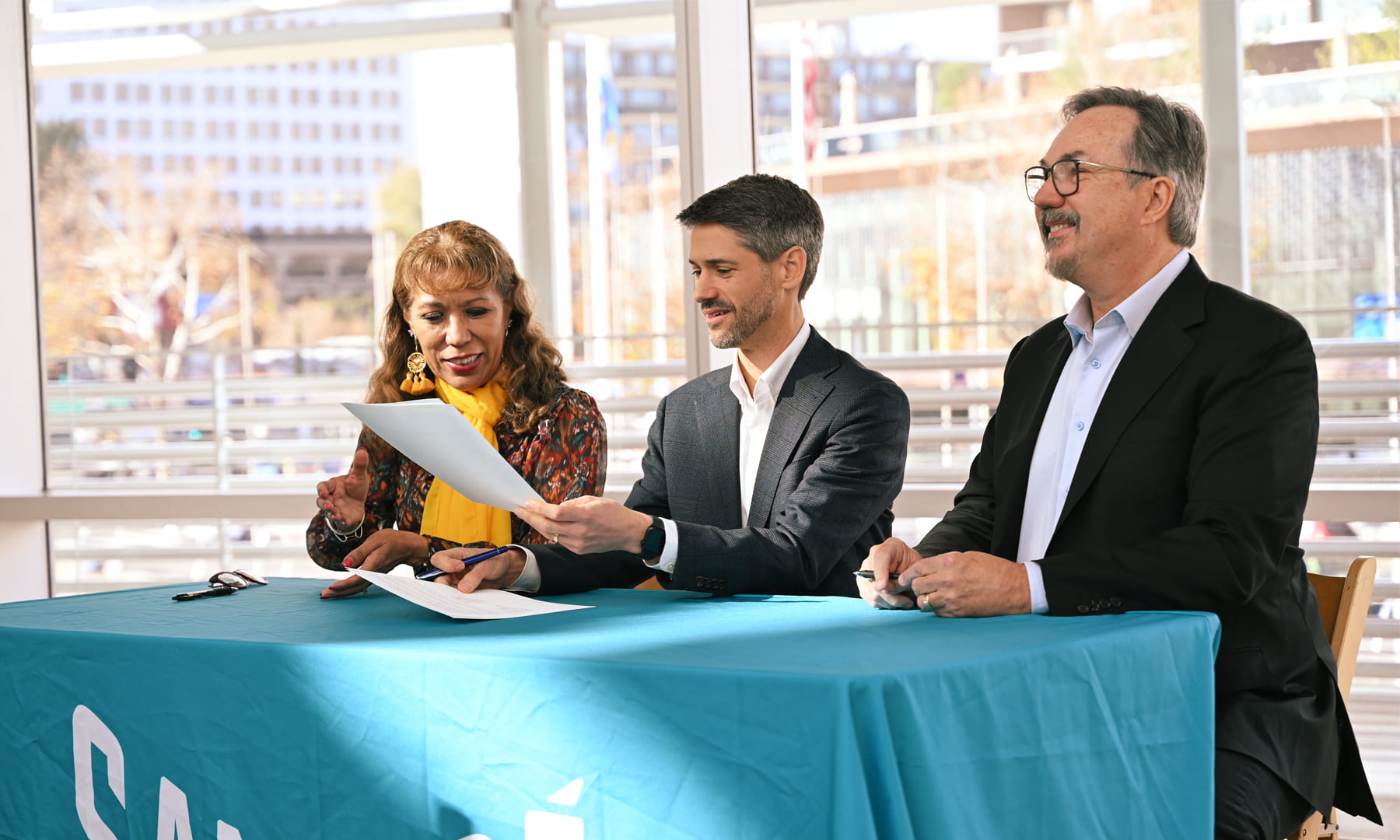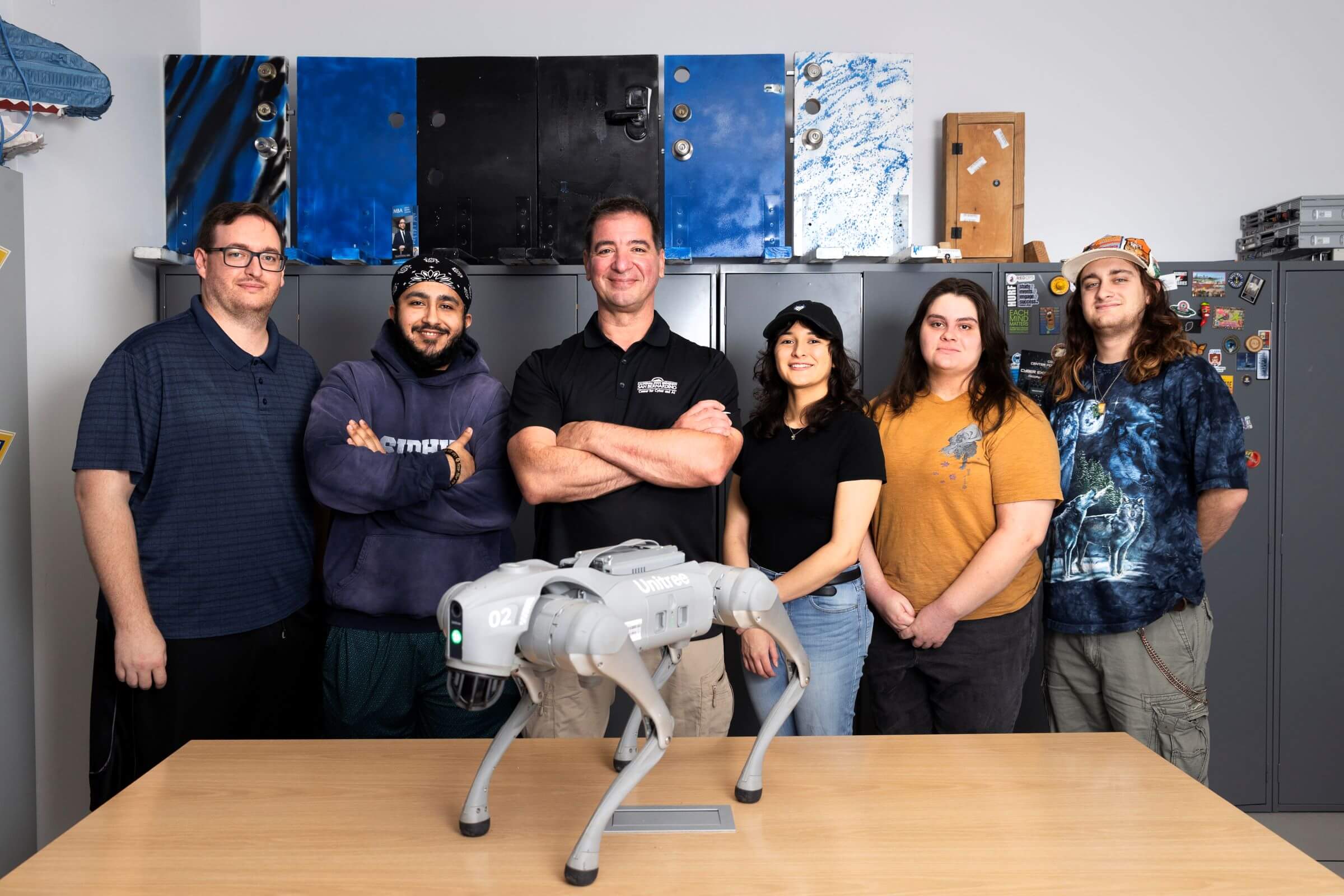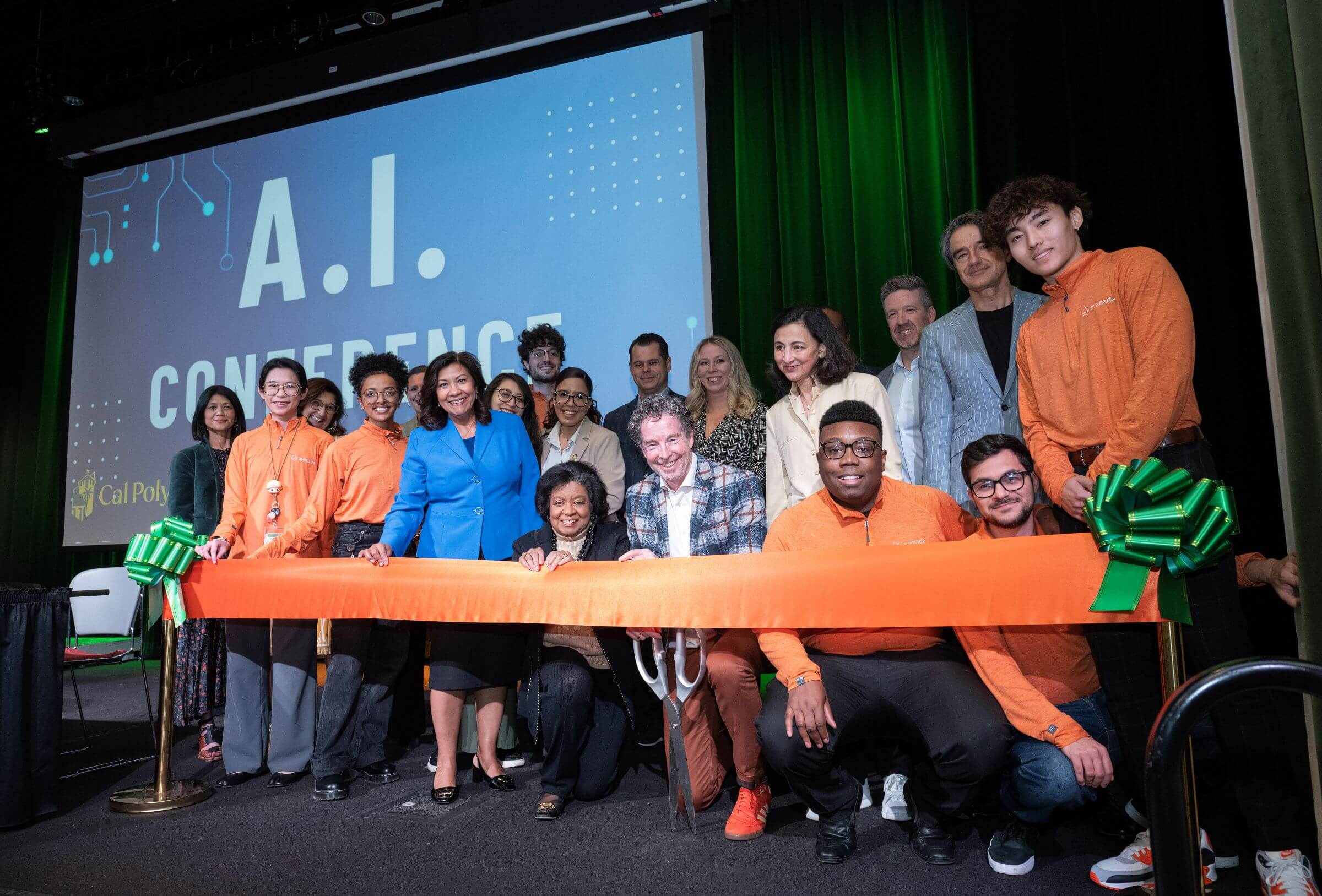With the recent rise in the broad use of artificial intelligence (AI), the California State University has committed itself to preparing faculty, staff and students to work with this emerging technology.
In early February 2025, the CSU announced a first-of-its-kind public-private initiative with some of the world’s leading tech companies to leverage the power of artificial intelligence to create an AI-empowered higher education system. The initiative has made
AI trainings, learning and teaching tools—including ChatGPT—available across all 23 CSU universities, ensuring that the system’s more than 460,000 students and 63,000 faculty and staff have equitable access to cutting-edge tools that will prepare them to meet the rapidly changing education and workforce needs of California.
Preparing students to use AI in their future careers by embedding AI education into the curriculum and giving them access to related tools and hands-on learning has become especially important. Computer and mathematical jobs that include AI—positions that can
pay upward of six figures—are expected to grow by
12.9% in the next 10 years. These opportunities will provide graduates promising careers that could drastically improve their economic stability.
“Every one of our graduates will be entering a workforce that will increasingly rely on artificial intelligence,” CSU Chancellor Mildred García said in a video for the International Association of University Presidents. “It’s our duty to bridge the digital divide and ensure that every student has the opportunity to become literate, skilled, ethical and creative in its use.”
Learn how the CSU is preparing students for the AI-powered workforce.
Degree in Hand
Currently, four of the CSU’s universities offer or will soon offer
degree programs related to AI.
First available in fall 2022, San Francisco State’s
Master of Science in Data Science and Artificial Intelligence combines theory and application while providing hands-on training that helps students develop computation, statistical and system-building skills. For spring 2025, 14 students were enrolled in the two-year program.
Cal Poly San Luis Obispo began offering an
Artificial Intelligence and Machine Learning concentration within its Computer Science major for the 2021-2022 academic year. Currently, 70 students are enrolled with the declared concentration and five students have completed the program—though a number of other students have taken the associated courses without declaring the concentration.
San José State offers three degrees that touch on AI:
Master of Science in Artificial Intelligence,
Bachelor of Science in Computer Science and Linguistics and
Bachelor of Science in Information Science and Data Analytics. While the first was introduced in fall 2021, the other two are longstanding programs that have recently adjusted to include AI in the curriculum.
In fall 2025, Cal State East Bay will add an
Artificial Intelligence and Machine Learning concentration within its Computer Science graduate program that will cover topics like robotics, computer vision and computer learning.
Cal Poly Pomona’s
Science Technology and Society Program is also developing an Artificial Intelligence Ethics & Society program, with both a major and a minor option. The program is currently under Academic Senate review, and the university plans to begin offering the major and minor in fall 2025.
Additionally, a number of CSUs offer individual AI-focused courses outside of a formal degree program and AI-related certificates, such as
CSUEB’s Certificate in Ethical AI in Business and Leadership for professionals.
‘Epicenter of the Future’

From left: SJSU President Cynthia Teniente-Matson, San José Mayor Matt Mahan and NVIDIA Vice President of Corporate Marketing and Developer Programs Greg Estes sign an MOU. (Photo courtesy SJSU/Brian Anderson)
As the region of San José establishes itself as a hub of AI innovation, San José State has been on the cutting edge of preparing its students for technology-focused careers.
In December 2024, SJSU announced a new partnership with the City of San José and tech company NVIDIA to upskill the AI workforce, by training both students and current employees in the technology. The partnership will provide access to AI tools, training and resources; encourage joint research projects; support new AI startups; and develop pathways for AI careers.
“San José State University’s collaboration with NVIDIA and the City of San José reflects our unique positioning in the epicenter of the future: Silicon Valley,”
SJSU President Cynthia Teniente-Matson said. “This relationship focuses on high-demand fields such as artificial intelligence, machine learning and data science, ensuring our graduates are ready to excel in the next generation of careers.”
SJSU’s Lucas College of Business is developing a comprehensive ecosystem of AI education for students by creating an AI task force—led by Leslie Albert, director of the SJSU School of Information Systems and Technology—looking at teaching, research and industry use around AI.
A major component of this push is incorporating AI learning into coursework for all degree programs. In a Big Data course with Professor Scott Jensen, students processed a Yelp data set of 7 million reviews to develop AI-generated summaries of restaurants using the tools LangChain, Google Gemini and Apache Spark on Databricks before presenting their findings to industry experts. In his accounting courses, Professor Colin Onita covers introductory concepts, ethics and the implications of AI; building AI tools for automating repetitive tasks; and using AI models to answer business questions with real and synthetic accounting data. And, students in Professor Jalal Sarabadani’s Systems Analysis and Design class implemented AI to develop project tasks and work flow. Some courses also now include micro-credentials on AI topics.
“Having AI in the classroom is crucial because students can get in-demand skills, like problem-solving abilities and hands-on experience that improves both technical proficiency and analytical thinking,” says Rangapriya Kannan, dean of the Lucas College & Graduate School of Business. “With the next generations, it’s thinking about becoming responsible digital citizens, as well as the ethical implications and potential impact of AI. AI literacy is what’s going to help students move forward. The career-ready requirements have changed, so they need to know how to use AI and how to do it effectively. AI won’t take your job, but someone who knows how to use AI will.”
This learning extends beyond the classroom as students apply their knowledge to professor-led projects. For example, the
AI for Social Good project, funded by the National Science Foundation, was launched at SJSU in 2018 by Professor Yu Chen and has since expanded to Long Beach, Pomona, San Bernardino and the Chancellor’s Office. It integrates AI education into relevant courses across disciplines, empowering students to develop AI-powered solutions to address social challenges within their communities. Other projects involve actively engaging students in research endeavors that utilize AI to tackle real-world problems.
Finally, in November 2024, the Lucas College of Business hosted the
Responsible Innovation in AI Conference that brought together industry experts from SJSU, Google, NVIDIA, IBM and others to explore the future of AI. Professor Anu Basu, director of the Silicon Valley Center for Entrepreneurship, and industry expert Vasudha Badri-Paul led the conference. Created for students, faculty and staff, the sessions covered the logistics, challenges and ethics of leveraging AI.
“The conference’s goal was to inform and inspire young entrepreneurs who represent the next generation of AI innovation and business,” Kannan says.
New Name for a New Reality

Vincent Nestler, director of CSUSB’s Center for Cyber and AI, with student members of the university’s cybersecurity club, Cyber and Intelligence Security Organization, and a Unitree robotic dog. (Photo courtesy CSUSB/Paige Wynne)
At Cal State San Bernardino, the center dedicated to cybersecurity recently changed its name to the
Center for Cyber and AI, reflecting the heightened focus on AI education for students.
“There’s a fundamental change that’s going to be coming in IT and cyber,” says Vincent Nestler, director of the Center for Cyber and AI. “My sense is that in the near term, maybe the next five years or less, AI is not going to replace humans, but humans using AI will replace humans who are not.”
“We need to get our students as AI-enhanced as possible, so that they’re more competitive when it comes time to enter the workforce. If you put a person who is well-versed in using AI against somebody who isn’t, there’s no comparison in the amount of work that they’ll produce faster, better, safer and cheaper.”
Beyond introducing AI-specific courses, Nestler has worked to
incorporate AI into classwork for all courses by designing his assignments to be impossible to complete without AI. To test students’ learning, he then poses questions that demonstrate the students understand what the AI accomplished.
“You have to think about creating assignments that are going to be more like what the students will be expected to do upon graduation,” he says.
The Center for Cyber and AI has also acquired technology that allows students to experiment with AI—including robotic dogs with AI capabilities that are currently being used for law enforcement purposes and Mobile ALOHA remotely controlled robotic arms that can learn how to do repeated tasks. Students are testing what information these machines track, how they are sharing that information, if they can be hacked and how they can they be secured.
Nestler has also developed an AI platform called CoyoteGPT that students use for class assignments instead of ChatGPT. The experience helps students learn the benefits and challenges of using a private, local AI platform versus a larger, public tool.
Finally, the Coyote Super AI Team invites students to explore how AI can enhance work in various fields they are interested in, from art to coding.
“They have to find what they are interested in and then figure out how AI augments what they do,” Nestler says. “If they get really good at a particular thing with AI enhancing [their work], they will do well in the near term.”
Equity in AI
San Diego State has partnered with University of California San Diego (UCSD) and the San Diego Community College District (SDCCD) to form the
Equitable AI Alliance (EAIA), aimed at giving all students, faculty and staff across these three systems greater access to the power of AI. The goal is to reduce artificial intelligence equity gaps by preparing students for the future of work and training faculty and staff in effective AI use in higher education.
“By focusing on AI needs, literacy and access, we aim to provide all students with opportunities to develop the skills needed for success in an AI-driven world,”
said David Goldberg, SDSU associate professor of management information systems and EAIA principal investigator.
Launched in 2024, the alliance first focuses on assessing campuses’ AI needs by expanding an AI student survey SDSU conducted in fall 2023 to UCSD and SDCCD. The results will help the systems understand how to better serve students and staff and how to grow its collection of shared AI resources.
Secondly, the systems aim to inform their communities on AI resources and how to use them. This includes making SDSU’s
Academic Applications of AI Micro-Credential available to the UCSD and SDCCD communities. Currently available only to SDSU students, faculty and staff as well as the CSU community, the micro-credential covers the effective and ethical use of AI tools.
“The micro-credential program is an important part of this initiative, providing students, faculty and staff across SDSU, UC San Diego and SDCCD with a shared resource to build foundational AI skills,” Goldberg said. “By creating a common platform for AI education, we are not only enhancing career readiness, but also supporting smoother transitions for students transferring between institutions within California’s higher education system.”
Finally, EAIA will develop and share AI tools across the institutions, ensuring equal access for all members of the campus communities. As part of this effort, SDSU and SDCCD will gain access to UCSD’s generative AI chatbot TritonGPT while they develop their own.
The California Education Learning Lab awarded the alliance a $1.5 million
AI Grand Challenge: Leveraging AI for Teaching and Learning grant, which will support the partnership for two more years. The program funded five projects involving the CSUs, UCs and California Community Colleges that promote AI-enhanced teaching and learning in higher education.
Empowering Innovation
With a $400,000 grant from the National Science Foundation, Cal State Fullerton launched its “CAP: INSPIRE — Inclusive Strategies for Promoting AI Research and Education, Empowering Underrepresented Students and Faculty” project to equip students with AI skills for future careers.
“This project will catalyze AI initiatives on campus by creating a centralized, interdisciplinary platform that connects students, faculty, industry partners and research organizations,”
said Yu Bai, CSUF associate professor of electrical and computer engineering.
To this end, the project will create an AI Hub, develop AI curriculum and offer training on the effective and ethical use of AI. These will provide faculty with greater opportunities to conduct AI-related research and work on AI applications while involving students from various disciplines, ensuring they get experiential learning with the technology before graduation.
“Overall, the AI Hub will be a dynamic ecosystem that nurtures AI talent, fosters interdisciplinary learning, and establishes CSUF as a leader in inclusive AI education and innovation,” Bai said.
In addition, the project will allow CSUF to forge relationships within the AI industry, further bolstering research and learning.
“Promoting AI technologies in both the educational landscape and research space is essential for our campus to thrive in the 21st century,” said Binod Tiwari, CSUF associate vice president for research and sponsored programs. “This grant project will allow Cal State Fullerton to create meaningful partnerships and provide the resources our students and faculty need to succeed in the AI workforce.”
Fostering Careers in AI

Cal Poly Pomona President Soraya M. Coley (center), Congresswoman Norma Torres (center-left) and Avanade Americas President Gord Mawhinney (center-right), among others, at the ceremonial ribbon cutting for the new Avanade AI & Innovation Center during CPP’s inaugural Artificial Intelligence Conference. (Photo courtesy CPP/Tom Zasadzinski)
Thanks to a decade-long partnership with technology company Avanade, Cal Poly Pomona is expanding academic opportunities related to artificial intelligence for its students.
In February 2025, the university hosted its inaugural
Artificial Intelligence (AI) Conference, themed “AI and Us: Building Inclusive and Adaptive Futures Together.” It included a keynote speech on AI readiness, sessions on topics like AI ethics and AI career pathways, and a networking event where campus departments, student clubs and offices demonstrated the current use of AI at CPP. Avanade’s AI program Temi shared information about the company with attendees.
“We knew it was important for students to be prepared for their future career success,”
said Jeff Cox, CPP interim executive director for institutional strategy and engagement. “They are going to interact with this technology in their jobs, and giving them hands-on knowledge and experience is of the utmost importance, as well as making sure that Cal Poly Pomona provides education opportunities and training.”
During the conference, Cal Poly Pomona held a ceremonial ribbon cutting for the new Avanade AI & Innovation Center located at CPP’s Innovation Village. The center will foster AI research, host hackathons and workshops, showcase innovations and trends in AI and facilitate collaboration with industry partners.
“This partnership with Avanade exemplifies our mission to foster innovation, inclusion and excellence in preparing our students for career success,” CPP President Soraya M. Coley said. “By combining our academic expertise with Avanade’s industry leadership, we are creating a platform that empowers our students and faculty to shape the future of AI and harness its transformative power responsibly. We stand at the precipice of the future, and it will take the brightest minds working at the world’s preeminent companies to ensure a better future for all, and that is why we are honored to be partnering with Avanade.”
Lastly, CPP supports a range of other events and resources to provide students hands-on
experience with AI, such as an
AI Fair and Hackathon and educational workshops.
Learn more about artificial intelligence at the CSU.